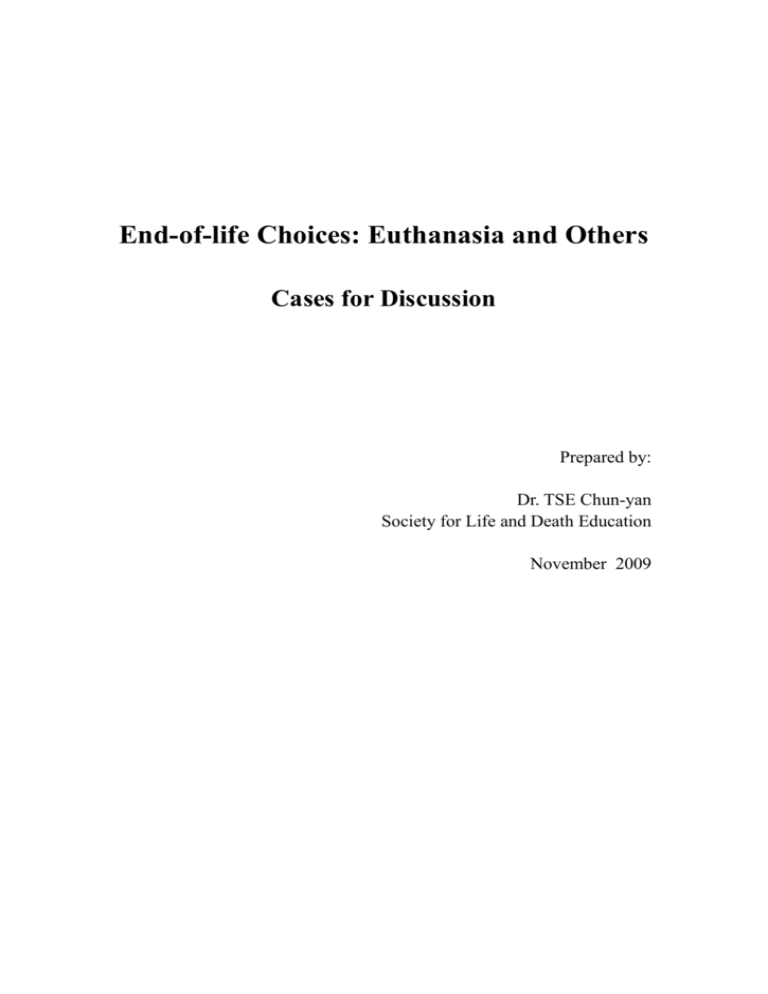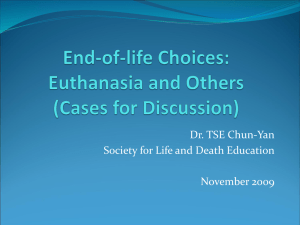End-of-life Choices: Euthanasia and Others Cases for Discussion
advertisement

End-of-life Choices: Euthanasia and Others Cases for Discussion Prepared by: Dr. TSE Chun-yan Society for Life and Death Education November 2009 Case 1 A patient with advanced incurable cancer is suffering from severe pain despite strong analgesics. He requests the doctor to kill him by a lethal injection. What should the doctor do? Basic question: Could the pain of the patient be better controlled? Comments: Pain and suffering of the great majority of terminally ill patients could be controlled with appropriate palliative care. Adequate pain control needs an appropriate choice and appropriate dose of analgesics, often with other modalities of treatment including psychological, social and spiritual support. Failure to control pain usually means that the treatment is not optimal. Next level of discussion: In the rare situation where the pain of the patient is still not adequately relieved by optimal treatment, should the doctor kill the patient by a lethal injection? Question redefined: 1. Should euthanasia be legalized in Hong Kong to allow killing of such patients? 2. Should the doctor kill this particular patient though euthanasia is illegal in Hong Kong? Next level of discussion (optional): Are there other alternatives to alleviate the suffering of the patient without resorting to killing? Comments: Palliative sedation (terminal sedation) could be used as a last resort to alleviate the suffering of a terminally ill patient. The patient is given sedatives to reduce his awareness of the symptoms. However, the patient will become drowsy and his life will likely be shortened by this.1 Follow up question: Is palliative sedation ethically justified? How is palliative sedation ethically differentiated from euthanasia? Comments: One can discuss the principle of double effect here. 1 It should be noted that the appropriate use of strong analgesics like morphine does not shorten life. Palliative sedation is not the same as the use of strong analgesics. Case 2 (This should be used as a follow up discussion to case 1) A 30 years old quadriplegic patient with no hope of recovery is living with his parents aged over 60. His lower limbs are totally paralyzed and he could barely move his upper limbs. He is wheelchair bound and needs assistance in feeding. The whole family is on CSSA. The healthcare team has arranged reasonable social support to the patient, including visits by members of patient groups. He has declined living in an institution because he wants to stay with his parents. He sees no hope in his future. He strongly feels that his existence is meaningless and a burden to his parents. He has been assessed by a psychiatrist. He is clinically not depressed, but is suffering from existential distress. He requests the doctor to kill him by a lethal injection. What should the doctor do? Point to note: In the Netherlands, patients eligible for euthanasia are not necessarily terminally ill, nor suffering from physical pain. Question redefined: 1. Should euthanasia be legalized in Hong Kong to allow killing of patients who are not terminally ill and not suffering from physical pain? 2. Are there REALLY no other alternatives to alleviate the suffering of the patient without resorting to killing? Comments: One may refer to the book 我要安樂死 by 斌仔 and the website of 路向四 肢傷殘人士協會 for discussion. Case 3 The son of a 70 years old terminally ill unconscious patient is informed by the doctor that the patient will die soon, and the doctor recommends no cardiopulmonary resuscitation (CPR) when the patient dies, in order not to prolong the dying process. The son agrees with the doctor that it is meaningless to carry out CPR. However, the daughter of the patient does not agree. She considers that, due to filial piety, life must be prolonged at all cost, and CPR must be done. What should the son do? Question redefined: 1. How should one assess the best interests of an unconscious patient? 2. Does filial piety means that all possible life-sustaining treatment must be given? 3. How should the final decision be made? Comment: Approaches to questions 1 and 3 are outlined in the Hospital Authority Guidelines on Life-sustaining Treatment. Case 4 A 60 years old patient is suffering from severe chronic chest disease which has a relapsing course with a downhill trend. After attending a public seminar on advance directives, the patient tells his son that he wants to make an advance directive, saying that he does not want intubation and mechanical ventilation when he has respiratory failure again. His son remembers that the patient had a previous episode of respiratory failure which was successfully treated by intubation and mechanical ventilation, and he does not agree to the decision of the patient. The patient expresses that he had a lot of suffering during the past episode of intubation, and he prefers no further intubation. The patient understands that he will probably die by refusing such treatment in a relapse. What should the son do? Question redefined: 1. The patient and the son have conflicting views on this. Whose view is more correct? 2. How should a final decision be made? 3. If the patient finally makes a valid advance directive stating his refusal of intubation and mechanical ventilation, could the son override the advance refusal when the patient goes into respiratory failure again? Comments: Quality of life decisions are value laden, and sometimes there is no absolute answer. A properly informed mentally competent patient’s decision should be respected. A valid advance refusal of life-sustaining treatment is legally binding, and should be followed in an applicable situation. Case 5 An infant with Down’s Syndrome suffers from intestinal obstruction. A major operation could cure the obstruction. His parents however refuse to sign consent for the operation, saying that the life of a child with Down’s Syndrome is miserable, and it is not worthwhile for the infant to go through the suffering of the major operation. The infant will die without the operation. What should the doctor do? Question redefined: 1. Is the life of a child with Down’s Syndrome miserable? 2. What factors should the parents consider when making the decision? 3. Could the doctor override the decision of the parents? Comments: While it may be acceptable to forgo complex surgery with poor outcome in infants with severe mental and physical disability, many people would consider that this case does not belong to this group. If the doctor considers that the decision of the parents is not in the best interests of the infant, the case could be brought to the court.







